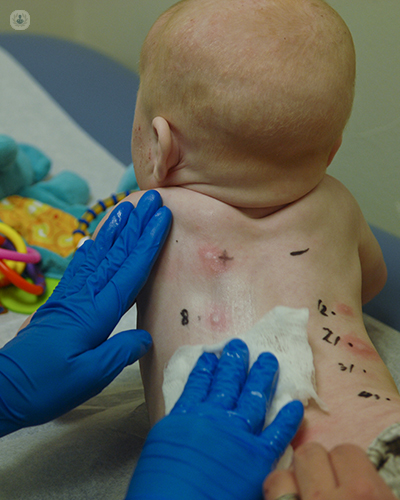Allergy testing
Dr Bhupinder Singh Sihra - Allergy & immunology
Created on: 11-13-2012
Updated on: 11-09-2023
Edited by: Carlota Pano
What is allergy testing?
Allergy tests are tests that are done to find out what known substances produce an allergic reaction in a person. This can be done in the form of a blood test, skin test, or a food elimination diet, which can help to determine what food intolerances an individual has.

Why have allergy testing?
Allergy tests are performed when there are indications that a person may have an allergy to a substance. An allergic reaction occurs when your immune system overreacts to something that has been inhaled (e.g. pollen), touched, or eaten.
An allergic reaction may show as:
- sneezing and a runny or blocked nose
- itchy throat and itchy skin
- watery or itchy eyes
- a rash
- swelling around an insect bite
- vomiting or diarrhoea
- anaphylaxis (a severe allergic reaction that can restrict breathing and should be treated as a medical emergency)
What does allergy testing consist of?
There are three common methods of skin allergy testing:
- Skin puncture test: Consists of placing on the forearm or upper part of the back a small sample of a number of substances that may be causing the symptoms on the skin. Then the skin is punctured lightly so that the allergen is introduced under the skin surface and after 15 minutes the reaction to each substance will be observed.
- Intradermal skin test: Involves injecting a small amount of skin allergen and observing if there is any reaction.
- Patch test: Adhesive patches containing allergens are placed on your skin. These are checked after 48, 72 and 96 hours.
You may also have a blood test, especially if you have suffered a severe allergic reaction to a substance. Blood is tested for suspected allergens in a laboratory.
An elimination diet may be recommended when doctors are trying to determine which foods are causing an allergic reaction. This involves eliminating specific foods for a period from your diet and later adding them back in when they have been ruled out.
Preparation for allergy testing
Before the allergy tests are done, the patient should inform the doctor about the medicines they are taking. In addition, it is important not to take antihistamines during the days before the test.
Aftercare
Once the results of the allergy tests are obtained, if they indicate that the patient has an allergy, the doctor will draw up an action plan. It is important that the patient:
- Avoids or limits contact with the allergen
- Takes medicine to avoid symptoms
- Possibly considers allergen immunotherapy








